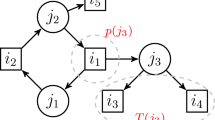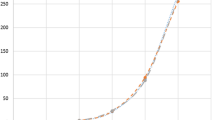Abstract
This paper deals with the problem of scheduling \(n_\mathrm{A}\) malleable and \(n_\mathrm{B}\) non-malleable jobs to be executed together on two parallel identical machines to minimize mean flow time. We propose a set of dominant schedules for this problem, and a dynamic programming algorithm that finds an optimal schedule in this dominant set in time \(O(n_\mathrm{A}^2n_\mathrm{B})\).







Similar content being viewed by others
References
Amoura, A., Bampis, E., Kenyon, C., & Manoussakis, I. (2002). Scheduling independent multiprocessor tasks. Algorithmica, 32(2), 247–261.
Blayo, E., Debreu, L., Mounié, G., & Trystram, D. (2000). Dynamic load balancing for adaptive mesh ocean circulation model. Engineering Simulations, 22, 8–24.
Blazewicz, J., Kovalyov, M. Y., Machowiak, M., Trystram, D., & Weglarz, J. (2006). Preemptable malleable task scheduling problem. IEEE Transactions on Computers, 55, 486–490.
Buisson, J., Sonmez, O., Mohamed, H., Lammers, W., & Epema, D. (2007). Scheduling malleable applications in multicluster systems. In IEEE International Conference on Cluster Computing (pp. 372–381).
Drozdowski, M., & Dell’Olmo, P. (2000). Scheduling multiprocessor tasks for mean flow time criterion. Computers and OR, 27, 571–585.
Dutot, P. -F., Eyraud, L., Mounié, G., & Trystram, D. (2004a). Bi-criteria algorithm for scheduling jobs on cluster platforms. In 16th ACM Symposium on Parallelism in Algorithms and Architectures (SPAA) (pp. 125–132).
Dutot, P. -F., Mounié, G., & Trystram, D. (2004b). Chapter 26, scheduling parallel tasks—Approximation algorithms. In Handbook of scheduling. Boca Raton: CRC press.
Feitelson, D., & Rudolph, L. (1990). Distributed hierarchical control for parallel processing. IEEE Transactions on Computers, 23, 65–77.
Hendel, Y., & Kubiak, W. (2008). Minimizing mean flow time for the two machines semimalleable jobs scheduling problem. In F. Serifoglu & Ü. Bilge (Eds.), Abstracts of the 11th Internat. Workshop on Project Management and Scheduling (pp. 136–140).
Lee, C. Y., & Cai, X. (1999). Scheduling one and two processor tasks on two parallel processors. IIE Transactions, 31(5), 445–455.
Ludwig, W. T. (1995). Algorithms for scheduling malleable and non-malleable parallel tasks. Ph.D. thesis, University of Wisconsin-Madison.
Ludwig, W. T., & Tiwari, P. (1994). Scheduling malleable and non-malleable parallel tasks. In Proceedings of the 5th ACM-SIAM Symposium on Discrete Algorithms (pp. 167–176).
Sadykov, R. (2012). A dominant class of schedules for malleable jobs in the problem to minimize the total weighted completion time. Computers and OR, 39, 1265–1270.
Turek, J., Wolf, J. L., & Yu, P. S. (1992). Approximate algorithms scheduling parallelizable tasks. In 14th ACM Symposium on Parallelism in Algorithms and Architectures (SPAA) (pp. 323–332).
Acknowledgments
This research of Yann Hendel and Wieslaw Kubiak has been supported by the Natural Sciences and Engineering Research Council of Canada (NSERC) Grant OPG0105675. The research of Wieslaw Kubiak has also been supported by the University Joseph Fourier, Grenoble.
Author information
Authors and Affiliations
Corresponding author
Rights and permissions
About this article
Cite this article
Hendel, Y., Kubiak, W. & Trystram, D. Scheduling semi-malleable jobs to minimize mean flow time. J Sched 18, 335–343 (2015). https://doi.org/10.1007/s10951-013-0341-1
Received:
Accepted:
Published:
Issue Date:
DOI: https://doi.org/10.1007/s10951-013-0341-1




